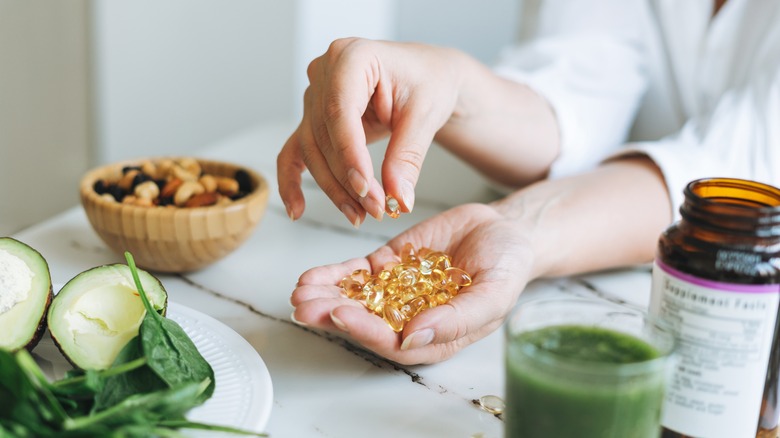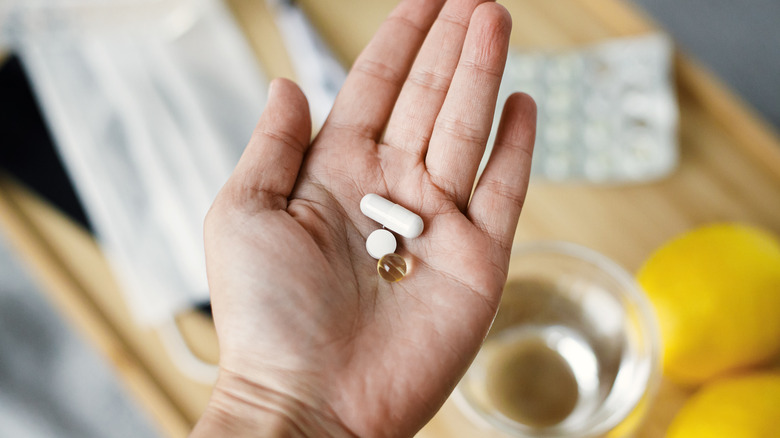The Best Time Of Day To Take Vitamin D
In addition to being a fat-soluble vitamin, vitamin D can also be classified as a nutrient and hormone, according to Harvard T.H Chan School of Public Health. Scientists associate various benefits with Vitamin D. A 2004 study posted in the American Journal of Clinical Nutrition notes that vitamin D as a hormone increases levels of calcium in the blood as well as its absorption, which facilitates bone mineralization.
A 2021 study published in The Nursing Clinics of North America explains that vitamin D has three main sources: sunlight, supplementation, and diet. Some common vitamin D-rich foods include soy milk, mushrooms, tuna, and fortified cereals, per Healthline. While the sun and diet are very potent sources of vitamin D, many people turn to supplementation, especially during the autumn and winter when the sun is not strong (via NHS).
Despite the benefits of supplementation, 35% of adults in the U.S. (and a billion people globally) have vitamin D deficiency (via Cleveland Clinic). Such a deficiency puts you at risk of chronic bone and back aches, impaired wound healing, hair loss, anxiety, and depression, according to Healthline. If you're thinking of supplementing your vitamin D, it's crucial to speak to your doctor to understand what dosage is best. As for the question of what's the best time of the day to take vitamin D, keep reading for more information.
Morning supplementation might be best
A 2022 study published in the journal Nutrients suggests that vitamin D plays a vital role in regulating the sleep cycle. However, while there's a proven link between vitamin D and sleep quality, it may be a better idea to incorporate the vitamin into your morning routine rather than taking it at night, according to Healthline. The source advises that taking supplements in the morning makes it convenient and easier to keep up with your daily vitamin D requirements. In addition, taking vitamin D at night might interfere with melatonin production and adversely affect sleep quality.
Morning supplementation is also great because you can take the vitamin alongside your breakfast. According to Cleveland Clinic, taking vitamins after eating might improve the vitamin's absorption rate. The source also advises against taking vitamins and other fat-soluble nutrients on an empty stomach as it can upset the GI tract, making you susceptible to diarrhea, stomach pains, and nausea.
How much vitamin D do I need?
It's important to consult your doctor for more information on the best vitamin D dosage. As a guide, the average adult needs 600 IU of vitamin D daily, according to Family Doctor. However, it's not always possible to consume this amount through food alone. Furthermore, children and adults over 70 might still not get enough, even if they ramp up their intake of vitamin-D-rich foods, per Family Doctor.
Supplementing can be a great way to get the right amount of vitamin D your body needs, according to Healthline. However, it's crucial not to overdose on your vitamin D intake. Overdosing on vitamin D can cause abnormally high levels of calcium in your blood, leading to high blood pressure, kidney stones, and heart arrhythmias (via Medical News Today). A 2017 study published in the journal Annals of Clinical Biochemistry notes that many clinicians have become increasingly aware of the dangers of self-administering vitamin D, so it's important to be sure that you don't take too much.



